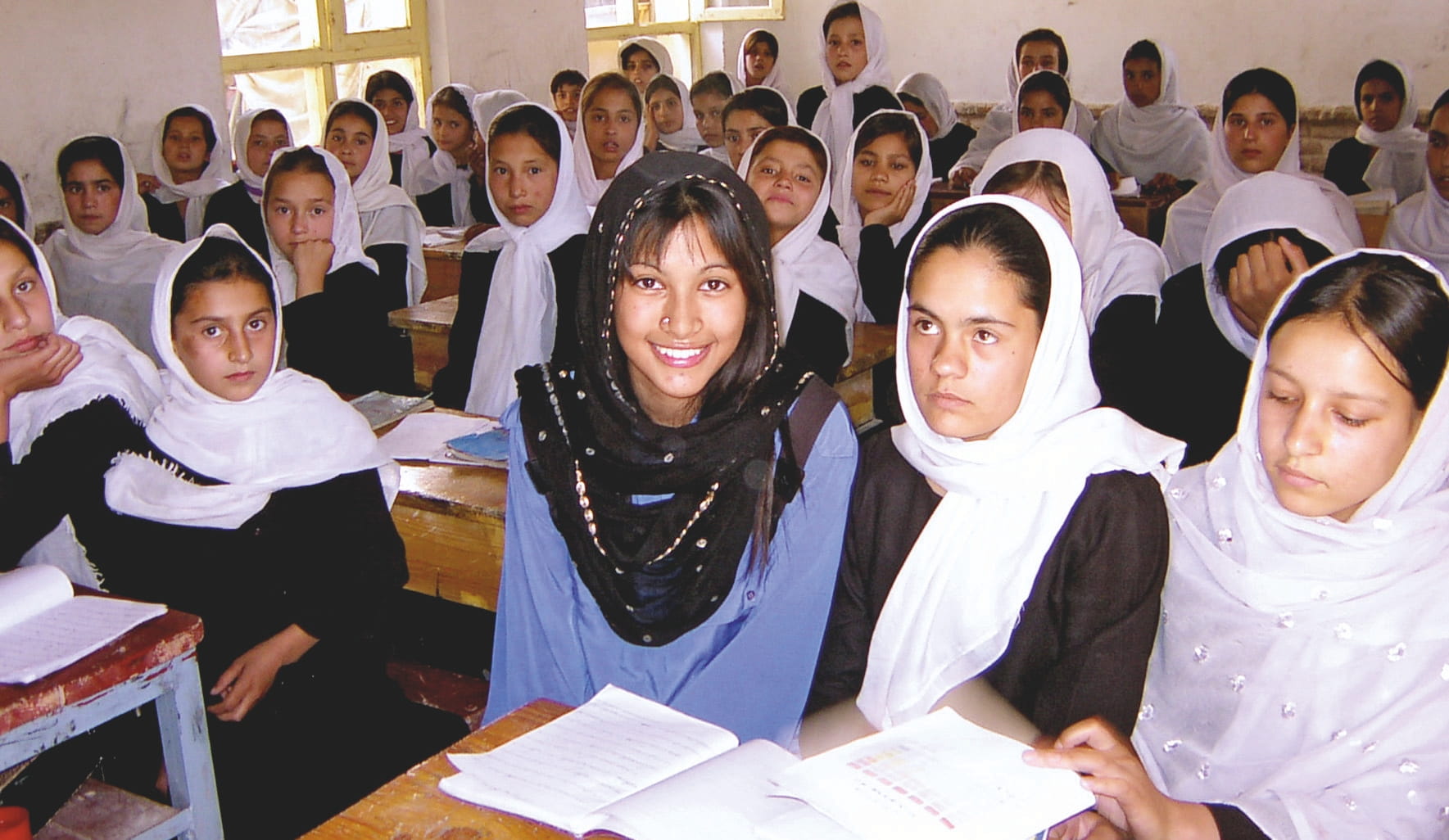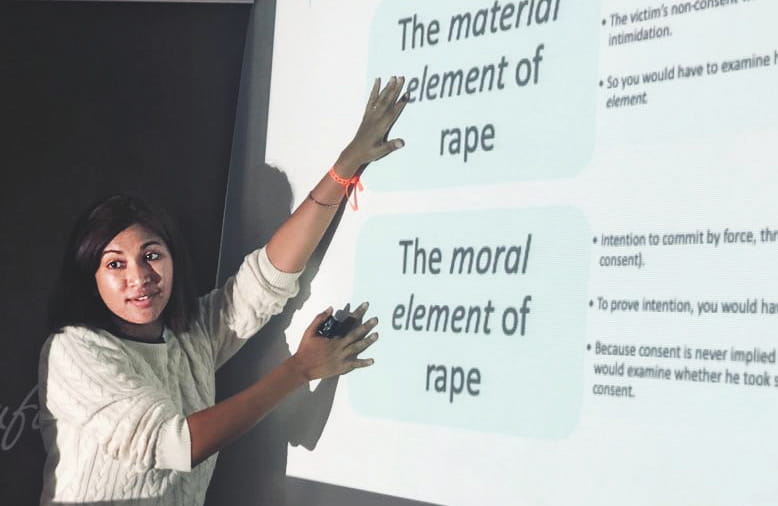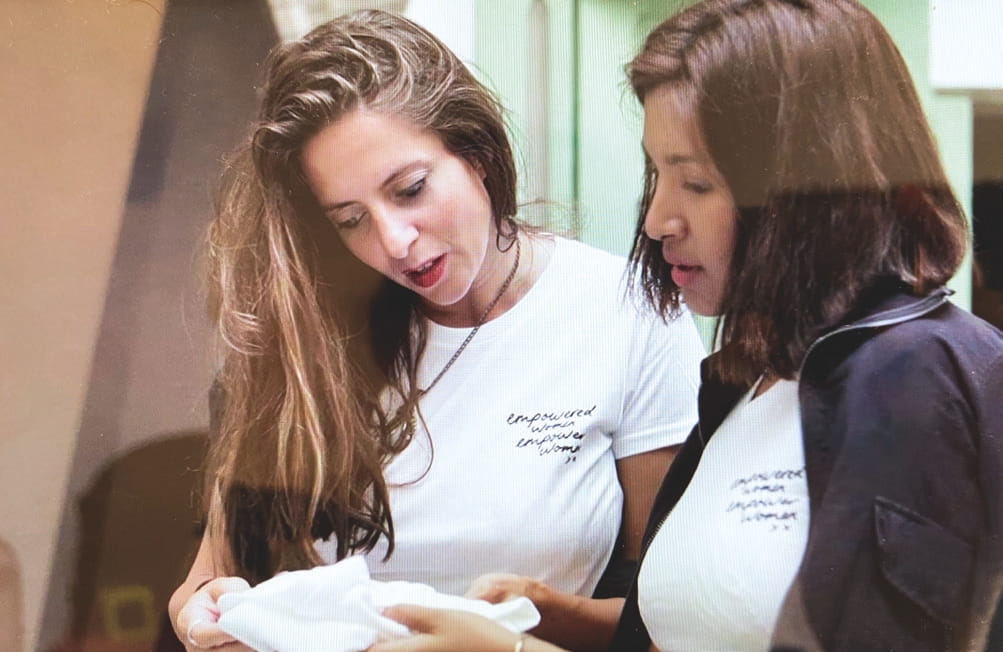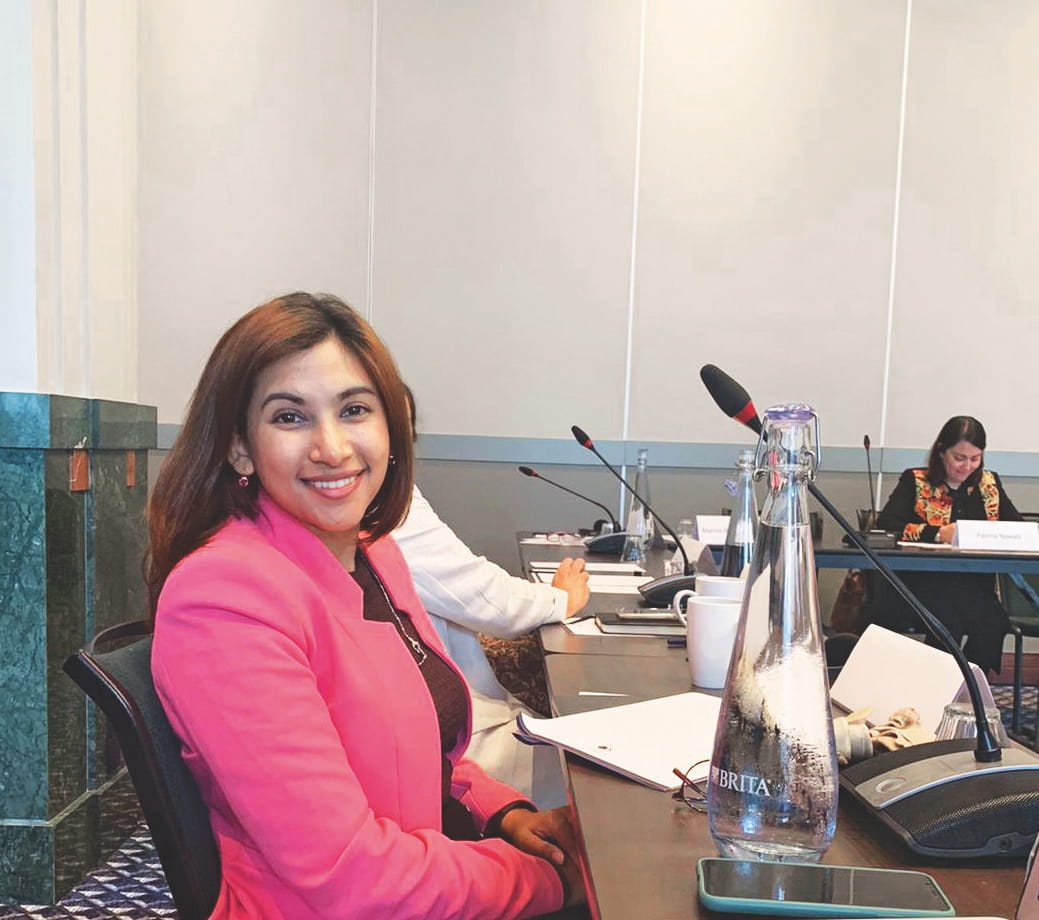Stories > A Voice For The Voiceless
A Voice For The Voiceless
A Singaporean human rights lawyer’s non-profit helps equip a new generation of human rights lawyers to fight sexual violence and improve access to justice around the world.
BY SHWETA PARIDA

Natasha Latiff (left) with Humaira Rasuli, co-founder and general director of her Afghanistan based non-profit.
rom the time she was 15 years old, Natasha Latiff knew she wanted to be a human rights lawyer. A glimpse into the struggles of young female human rights lawyers fighting in corrupt and conservative systems around the world convinced the precocious teenager that her mission was to build a new generation of savvy lawyers to end gender-based violence.
At the time, Singapore’s public school curriculum did not offer an extensive choice of liberal arts subjects to study at the junior college level. This made Natasha keen to venture overseas. The spirited Singaporean wrote a personal statement to the principals of almost 60 junior colleges in the UK. “I wanted to take law as one of the subjects for my GCSE A levels, but this option was not available in Singapore then,” she recalls.
“I heard back from two schools and eventually accepted an offer from one of them,” she reminisces.
Although the school offered her a 75 per cent scholarship, Natasha’s family was only able to afford 10 per cent of the annual fees, amounting to £4,500.
Seeing her determination, the principal told her that he would refund the 10 per cent if she managed to get three straight As. Both parties kept their end of the bargain. This marked the beginning of her legal career as she went on to champion human rights for some of the most marginalised women.
A GLIMPSE INTO THE WORLD
“ I grew up in Singapore at a time when the Internet was just coming into homes,” she says. “It opened my eyes to a whole new world. I used to read up on how people elsewhere lived and how their lives were different from ours. Around that time, 9/11 and the war on terror happened, which unfortunately gave rise to more Islamic fundamentalism and Islamophobia. I was curious to learn more.” Her inquisitive mind also led her to become pen pals with a girl from Afghanistan — a bond that would last for years to come.
As Natasha pursued her studies in the UK, she also delved deeper into her goals and made the bold decision to travel to Afghanistan four years after the US had toppled the Taliban rule. All of 17, she worked part-time as a dishwasher to save up enough money to buy a ticket to Kabul.
Ask her why she embarked on a risky journey and she replies pensively: “After reading my pen pal’s letters, I became curious about her life. We were both Muslims, but there was a huge difference in the way we lived. More importantly, I wanted to see what I could do in the future to help the women there, where laws did not always favour them.”
She says that as she started to learn more about Shariah Law, she realised that the application of the law is chiefly about how it can be strategically interpreted to address inequities and biases. “Law is written in words but it is malleable in application,” she opines, adding that even the Western secular law is inherently elitist and must be consistently fine-tuned to make it more equitable.

As a 17-year-old, Natasha Latiff’s curiosity about women’s lives in Afghanistan and the desire to help them in areas of law and education led her to spend a considerable time in the country.
“I didn’t go into the system trying to take a superior moral stand. Building relationships is important in any society.”
Natasha Latiff, founder, Strategic Advocacy for Human Rights
ACTIVISM SANS MORAL SUPERIORITY
The determination to create more equitable gender-based laws compelled her to set up Strategic Advocacy for Human Rights (SAHR) during her second year of law school in 2008. SAHR’s network is made up of human rights lawyers and civil society activists based in countries around the world such as Argentina, Kenya, Mexico, Nigeria, South Sudan and Vanuatu. They take up cases of female survivors of sexual violence in conflict zones, as well as LGBTQ-related cases where the local laws are deemed to put the marginalised communities at a disadvantage.
“To support other human rights defenders and lawyers around the world, we work hand in hand as a collective,” she says. “Just this month alone, I received 73 requests. We collectively assess where we can make the maximum impact.”
The non-profit, which conducts law workshops for human rights lawyers, also lobbies political organisations, governments and institutions for amendments to discriminatory laws against women, and derives its funding from governments and foundations that have special funding allocations for such human rights organisations globally.
“What lawyers do in Singapore is different from what lawyers do in conflict countries. For instance, in Afghanistan, you build up the justice system from scratch — you help in drafting laws that reflect the needs of the people while still considering the local socio-cultural context. You need to train the judges and prosecutors. We use different power levers where intention, influence and strategy come together to enable us to take on difficult cases.”
Post-American intervention, Afghanistan experienced a new vigour, says Natasha. “Everyone in the country felt energised, buoyed by the sentiment of starting anew,” she shares. “There was a kind of activism that was all-pervasive, from art to poetry, and among civil society. I admired the energy of the youth who were forming organisations to bring about a positive change. Coming from a society like ours, where relatively older people lead the charge, the shift was exhilarating.”
But while the nation was in the throes of being rebuilt, political upheaval cast a shadow on advocacy for the rights of women. Any local or outsider advocating for their rights began to be viewed suspiciously — a cumulative effect of years of invasion and the presence of foreign forces that have kept the country perpetually on the boil.
When faced with a case where a female survivor of sexual assault was accused of adultery and, according to the local Shariah Law, had to produce four witnesses to prove her innocence, she had to rethink her views on advocacy through a confluence of societal norms, cultural habitude and local interpretation of law.
“First, I learnt that you have to work with the pace of any society,” she says. “We realised that we were not there to fight for women’s rights as understood in the Western world, but to prevent women from being unfairly prosecuted, without taking an antagonistic approach.”
Consequently, after referring to activistdriven literature on the interpretation of these laws, she found that a victim of rape did not have to produce four witnesses to defend an accusation of adultery.
The woman was released without prejudice. Through this case, Natasha learnt to work within the framework of Shariah Law and not necessarily the Western understanding of human rights, which cuts no ice with the judiciary.
“I didn’t go into the system trying to take a superior moral stand. In conservative societies, human rights can be viewed with suspicion. I was even accused of being a spy. Building relationships is important in any society,” she says, stressing that it is important to cleave local politics from the human rights focus.


Through her nonprofit Strategic Advocacy for Human Rights (SAHR), Natasha Latiff delivers a seminar on prosecuting rape cases; here, she is seen with Sara Bergamaschi, executive director, SAHR.
START OF A NEW ERA
By 2017, after nearly 10 years of establishing SAHR, the joint work of lawyers had built enough traction for the Afghan law to be amended to safeguard rape victims from being prosecuted for adultery.
“In Afghanistan, it is a big challenge for women to work, let alone within the judicial system,” says Afghan human rights lawyer Yalda Ahmadi. “But with Natasha’s support, we worked on extremely hard cases, making use of laws that had no precedent.”

The human rights lawyer is seen here attending the EUled Afghan Women Leaders Forum in Brussels in 2022.
“Through Natasha, I realised how Singapore is more collectivist than Western societies. Individuals often perceive themselves to be members of socially cohesive groups rather than autonomous actors.”
Sara Bergamaschi, executive director, SAHR
However, the carefully built system collapsed in August 2021 when the US withdrew its troops and the Taliban was back in power. Working with the fragile system tested the tenacity of Natasha’s local team. “Amid the uncertainty, we had to reprogramme ourselves as well as the entire lexicography,” she says. “For instance, gender-based violence became social violence. We got approval to work in September 2021.”
The entire situation has also introduced a plethora of mental health problems among women and girls in Afghanistan, she shares. “Girls are considered a liability in regions that are constantly in conflict and warlike situations, so their parents marry them off early. Marriage acquires a functional value. We provide them with trauma management without judging their situation.”
While Afghanistan holds a special place in Natasha’s life — her husband is a German national of Afghan origin — she works with associates in several countries on cases that are contextually unique.
“In rural Kenya, for instance, we received a case of two lesbians who were subjected to correctional rape. We worked with an Indonesian activist to help disabled survivors of sexual violence in Banda Aceh,” she says. “We don’t always win, but that is never our sole objective. Our goal is to open the conversation on how the survivors of sexual violence can access justice.”
Having lived and experienced different countries and cultures, she now appreciates Singapore’s distinct ability to bring people of different races and religions together through conversations. When she moved back to Singapore in 2014 along with her husband (so she could sit for her local bar exams), he felt instantly at home, she shares. “Previously, he would often be stopped at airports and questioned due to his ethnic identity. But in Singapore, he felt safe and comfortable. It’s so easy to assimilate into the multicultural tapestry of this country,” she says.
One of her colleagues at SAHR, Italian Sara Bergamaschi, echoes this sentiment. “Through Natasha, I realised how Singapore is more collectivist than Western societies. Individuals often perceive themselves to be members of socially cohesive groups rather than autonomous actors,” she says.
Where does Natasha see human rights activism heading in the near future? “Different women experience violence differently. For instance, a Singaporean woman has recourse to a proper justice system but a Palestinian female refugee in Jordan might not report a crime against her for fear of being sent back. My goal is to bring uniformity to rape and sexual violence laws around the world so that women throughout have equal legal resources at their disposal, especially disadvantaged ones.”
